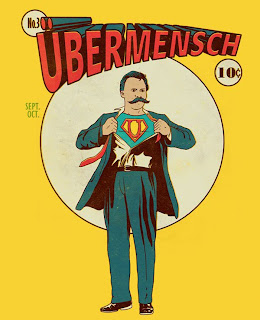
So, I've been reading this H.G. Wells book. Most people assume it's one of the classics. But to be honest, like everyone else I've talked to so far, I had never heard of "Star-Begotten," released in 1937. I shouldn't be surprised, really, that this text discusses the some of the more philosophical points of religion and Nietzsche's Superman. 'Why not?,' you ask. Well, H.G. Wells was friends with that whole cliquey of philosophically pondering fantasy sci-fi writers from the early 1900's = C.S. Lewis, J.R.R. Tolkien, E.R.R. Eddison, (geeze dudes: what's with all the initials?) Olaf Stapledon, and others. So here I am, getting towards the end of the book, and I come upon the following passages:


as they grew up they will have found themselves mentally out of key. They will have found a disc[on]certing inconsistency about things in general. They will have thought at first that the abnormality was on the side of particular people about them and not on their own.
 They
Theywill have found themselves doubting whether their parents and teachers could possibly believe what they were saying. I think that among these Martians, that odd doubt - which many children nowadays certainly have - whether the whole world isn't some queer sort of put-up job and that it will all turn out differently presently - I think that streak of doubt would be an almost inevitable characteristic of them all"
'You spoke just now of stale religion,' he went on. 'Such a lot of
things in life now are stale. Out of date.... I agree....'